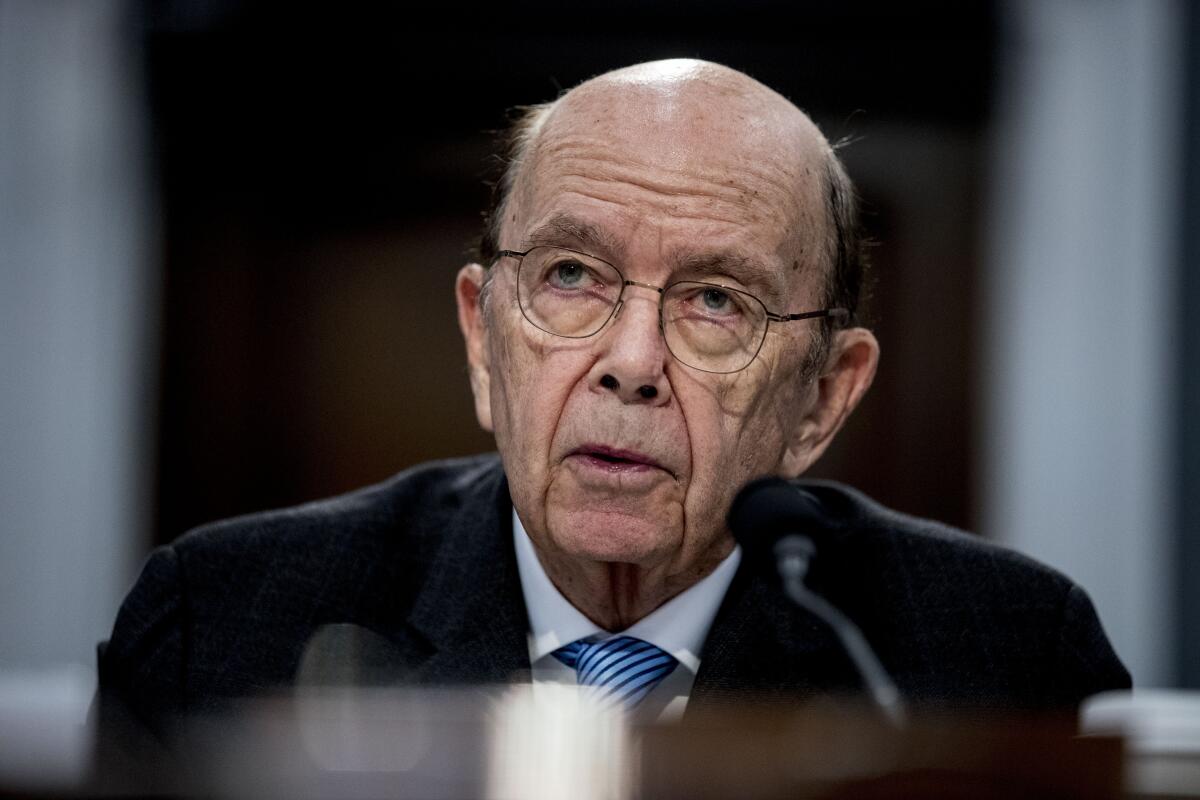Justice Department won’t prosecute Trump Cabinet official over census citizenship question

- Share via
WASHINGTON — The Justice Department declined to prosecute former Commerce Secretary Wilbur Ross for misleading Congress about the origins and purpose of asking about citizenship on the 2020 census, a government watchdog told Congress on Monday.
Democratic lawmakers had asked the Commerce Department inspector general to investigate whether Ross had lied while testifying in 2018 about why the Trump administration was pushing — for the first time in decades — to add a citizenship question to the census.
Commerce Department Inspector General Peggy E. Gustafson said in a letter to Congress released Monday that she found that Ross was misleading when he testified under oath in March 2018 that the question was being added at the request of the Justice Department.
In fact, Gustafson wrote, “evidence shows there were significant communications related to the citizenship question among the then-Secretary, his staff, and other government officials between March 2017 and September 2017.” The Justice Department did not request the addition of the question until December of that year.
The letter states that the results of the investigation were “presented to and declined for prosecution by the Public Integrity Section of the DOJ’s Criminal Division.”
House Oversight Committee Chairwoman Rep. Carolyn Maloney (D-N.Y.) praised the inspector general’s finding in a statement, without addressing that the Justice Department declined to prosecute.
“Lying to Congress is unacceptable, and the [inspector general] did the right thing by referring Secretary Ross’s conduct to the Justice Department,” she said.
The Supreme Court ultimately rejected the Trump administration’s bid to add the citizenship question, citing Ross’ failure to provide an honest explanation for his agency’s reasoning about why it was making such a major change. The ruling came in a lawsuit brought by California and other states with large immigrant populations that claimed the question was really a Republican ploy to increase that party’s clout.
Activists were concerned that the question, or even an assumption that the question was included, would lead fewer people to respond to the census.
The decennial census plays a key role in divvying up congressional representation and the allocation of billions of dollars in federal, state and local funding.
The Trump administration was marked by high-ranking officials frequently refusing to testify before Congress, which oversees the executive branch.
Ross, however, testified willingly before congressional committees, though he soon found himself under investigation after Democratic lawmakers accused him of lying under oath, a federal crime punishable by up to five years in prison.
In addition to seeking an investigation into Ross’ testimony about the citizenship question, lawmakers also asked the inspector general to examine if Ross had failed to disclose the role of Thomas Hofeller, a deceased GOP strategist, played in the administration’s decision to add the question. Hofeller’s role became public after his death in 2019, when his estranged daughter went through his computer files that revealed he helped draw congressional districts to benefit Republicans.
The inspector general found that while wording in Justice Department communications was similar to Hofeller’s work examining how adding a citizenship question would allow Republicans to block out Democrats when drawing district boundaries, its investigation was “unable to establish that the Political Strategist had a substantive public policy role in the addition of the citizenship question to the 2020 Census.”
More to Read
Get the L.A. Times Politics newsletter
Deeply reported insights into legislation, politics and policy from Sacramento, Washington and beyond. In your inbox twice per week.
You may occasionally receive promotional content from the Los Angeles Times.











